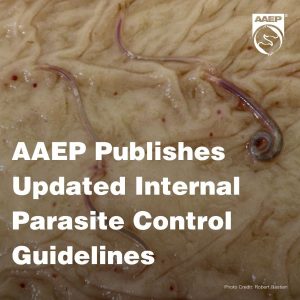AAEP Publishes Updated Internal Parasite Control Guidelines
From AAEP:
The American Association of Equine Practitioners (AAEP) has issued revised Internal Parasite Control Guidelines to help minimize the risk of parasitic disease and maintain the effectiveness of current drugs for as long as possible by delaying further development of anthelmintic resistance.
The guidelines, originally created in 2013 and last revised in 2019, account for recent advances in knowledge concerning increased anthelmintic resistance and optimization of parasite control management practices. The guidelines also address common misconceptions and offer parasite control program recommendations for senior horses (over 15 years old), mature horses (between 5 and 15 years old), and young horses (under 5 years old).
“We have seen dramatic development in the field of equine parasite control over the past 10 years, since we first launched these guidelines, and we work hard to keep our recommendations up to date,” said Martin Nielsen, DVM, PhD, DVSc, DAVCM, DEVPC, Schlaikjer Professor of Equine Infectious Diseases at the University of Kentucky.
Important conclusions to be drawn from the revised guidelines are to:
- Perform fecal egg count reduction tests annually to ensure that you are using effective dewormers in every herd or barn.
- Recognize that no anthelmintic will eliminate all parasitic stages from a horse.
- Continue using fecal egg counts once or twice per year to stratify horses into low, medium and high shedders to reduce pasture contamination.
- Deworm all horses at a baseline rate and target selected horses more often based on fecal egg counts.
- Not use fecal egg counts to diagnose disease in horses as there is no correlation between fecal egg counts and disease-causing parasite life stages.
- Discontinue deworming all horses with fixed intervals year-round and stop blindly rotating anthelmintic classes.
The guidelines were reviewed and updated by the AAEP Internal Parasite Control Guidelines Task Force, chaired by Dr. Nielsen and comprised of 10 AAEP members predominantly board certified in veterinary internal medicine, veterinary parasitology and/or veterinary microbiology. The updated guidelines were reviewed and approved by the AAEP Infectious Disease Committee and board of directors.
View the guidelines or save them to your mobile device at https://aaep.org/resource/internal-parasite-control-guidelines. AAEP members may also access the guidelines through the AAEP On-the-Go app; search “AAEP On-the-Go” at your app store to download.
In addition to the Internal Parasite Control Guidelines, AAEP guidelines for more than 30 equine infectious diseases and foreign animal diseases are accessible through the app and the AAEP Guidelines Library at https://aaep.org/guidelines-resources/resource-library/guidelines-library.











